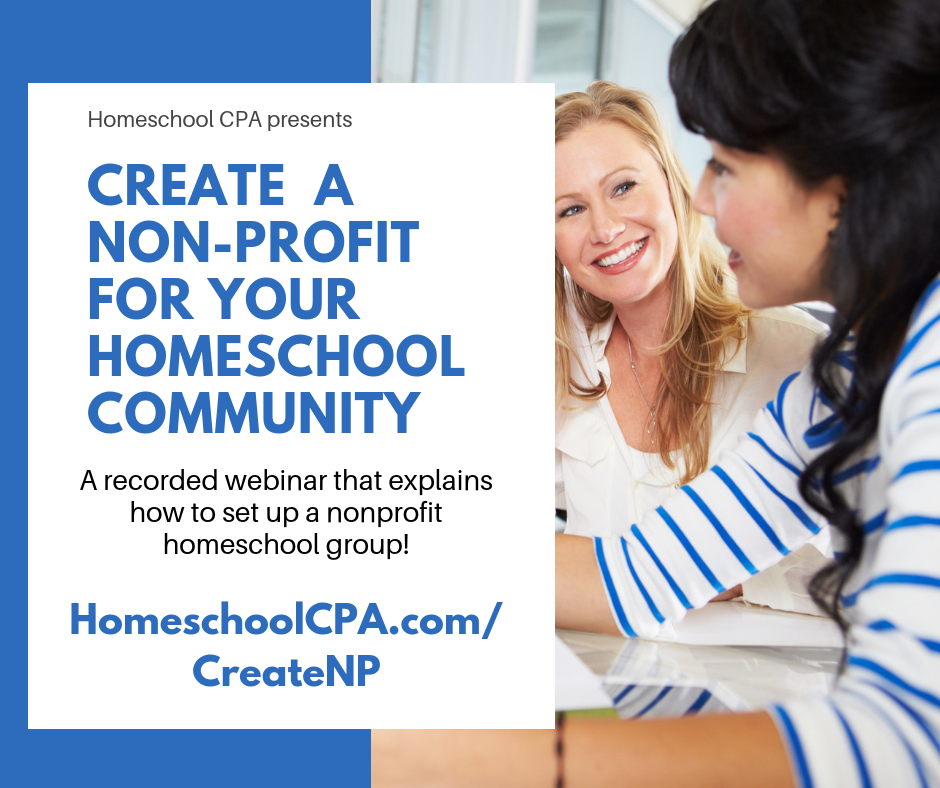
There is a lot of confusion about whether Classical Conversations Communities should be using churches for their Community Day activities.
Background: Unlike most homeschool programs and co-ops, Classical Conversations Communities are usually not nonprofit organizations. Instead they are for-profit businesses owned by the Communities’ Directors who have licensing agreements with Classical Conversations, Inc. This may cause problems when a CC Community meets in a church. Many churches avoid hosting businesses on their property for several reasons including:
- Jesus chastised the money-changers in the Temple in Mark Chapter 11. Many churches have a policy against business owners conducting their business on church property.
- Churches enjoy property tax exemption from their state governments for their religious activities. Hosting a business may threaten that property tax exemption and churches would have to pay property tax. Churches want to avoid violating their property tax exemption and therefore do not typically allow business to be conducted on their property.
I wrote a long FAQ page about homeschool groups using churches here.
One tax assessor in North Carolina, Jeremy Akins, kindly answered several questions regarding CC use of church property in his county Alamance, NC.
His document “Classical Conversation FAQ” answers several questions including:
- How authoritative is this document?”
- My CC Community operates out of a church. Does this put the church at risk of losing its property tax exemption?
- Classical Conversations is Christian education. It aligns with the values and beliefs of the host church. Shouldn’t we be covered under the religious rather than nonprofit educational exemption?
- What if my church wants to set up a CC Community operated by the church itself?
- We only use the fellowship hall and outdoor areas for 6 hours per day, 30 days per year. Isn’t this an incidental use by members of the general public? I’ve heard this doesn’t jeopardize the exemption.
- What if I want to operate a CC Community with all volunteer staff (no payments to the Director / Tutors, just the cost of the curriculum, license fee and facility fee)?
- Are you saying that a CC Community cannot be structured as a for-profit business?
You can read Mr. Akins’ response (5 pages) in full here. Alamance County NC Classical Conversations FAQ.pdf
Although Mr. Akins’ FAQ document is limited to his jurisdiction (Alamance County, NC), he does make his assessment based on state-wide laws. Additionally, his FAQ gives helpful insight into how a property tax assessor thinks and evaluates a for-profit homeschool business using church property to conduct its business.
Nonprofit Status for CC Communities
I would like to expound on one question that Mr. Akins answered:
Does this mean my CC Community must obtain 501(c)(3) status?”
No, although that is something your Community may consider. All that is required for the purpose of the exemption is a North Carolina status as nonprofit.
Let me explain the difference between nonprofit and tax exempt status:
Nonprofit status is granted by your state, usually the Secretary of State’s office. Creating a nonprofit corporation is forming a new legal entity.
501c3 tax exempt status is offered by the IRS to eligible nonprofit organizations.
Think of it like being married: Your state approves marriage licenses and your form a new family entity when you get married. You also are eligible for tax benefits from the IRS (called Married Filing Joint) if you are eligible and want it. Your homeschool group doesn’t have to apply for 501c3 tax exempt status with the IRS. Just like a married couple does not have to file a joint tax return; they can file Married Filing Separately. While that usually costs more in taxes, but it can be done.
The same is true for a nonprofit organization. If a nonprofit does not apply for 501c3 tax exempt status with the IRS, the nonprofit will owe federal income tax on any surplus it has each year. The nonprofit organization will be required to file a federal corporate tax return (Form 1120) to report its income, expenses and profit. The federal corporate tax rate is 21%. So most eligible nonprofits apply for 501 federal tax exempt status and avoid paying 21% of their profit to the IRS.
Please understand that Mr Akins’ FAQ is addressing property tax exemption on churches, not federal income tax exemption, so he is addressing that tax and its tax basis.
Resources for Nonprofit and Tax Exempt Status
I have some resources to explain nonprofit and federal income tax exempt status. I do not make assessments regarding state and county property tax. They are different taxes and different tax agencies. I focus on federal income tax exemption from the IRS.
Difference between nonprofit and tax exempt status (3 minute video)
Do I Have to Be Tax Exempt? (3 minute video)
Is My Homeschool Group Required to Have 501c3 Tax Exempt Status? (13 minute podcast)

Creating a Nonprofit webinar: This webinar recording is helpful for new nonprofits, existing homeschool group, or for a business wanting to convert to a nonprofit organization. The webinar runs about 90 minutes and covers:
- The difference between a business and a nonprofit organization
- The advantages and disadvantages of being a nonprofit organization
- Forming a board: who can be one it, what do they do, etc.
I have helped several CC Communities convert to nonprofit organizations and assisted over 200 organizations apply for 501c3 federal income tax exempt status. If you have questions about the process, start with the resources above. If you have specific questions, we can arrange a phone consultation.
